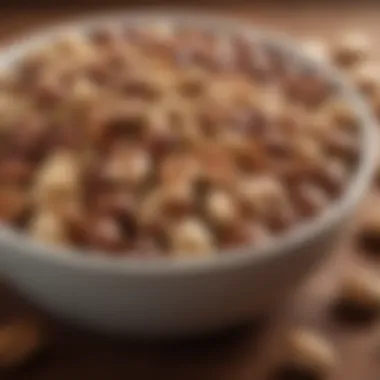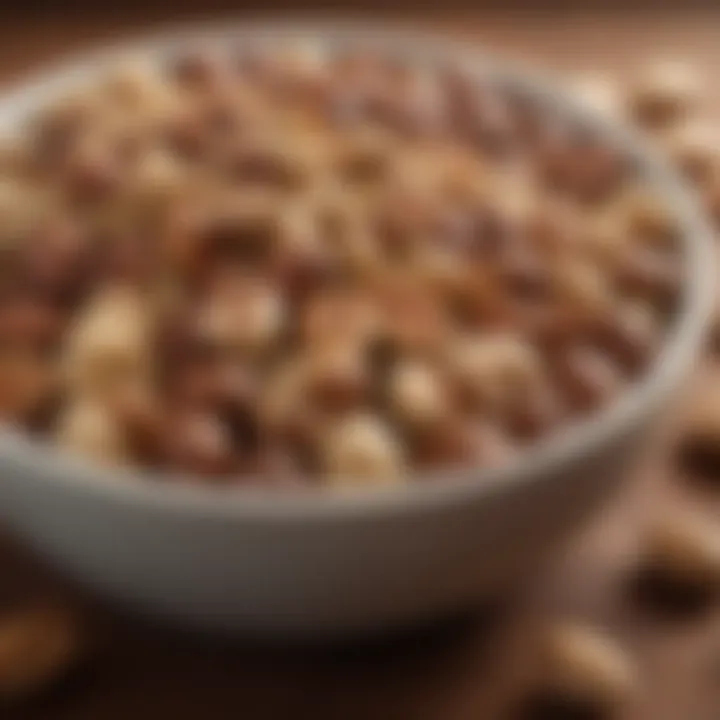Understanding Carb Smart Snacks: A Comprehensive Guide


Intro
In today's health-conscious world, understanding the significance of carbohydrate intake is crucial. Individuals looking for healthier lifestyle choices face a multitude of snacks that claim to fit into their dietary restrictions. However, distinguishing which snacks are genuinely beneficial requires careful analysis. Carb smart snacks emerge as a focal point in this discussion.
This article delves deep into carb smart snacks, elucidating their nutritional benefits, practical ideas, and recipes for diverse dietary preferences. The significance of managing carbohydrate intake, particularly for health-conscious individuals, cannot be overstated. We will explore the types of ingredients that constitute carb smart snacks and how to effectively incorporate them into daily routines. Furthermore, we aim to clarify common myths surrounding snacks, providing actionable advice to assist in making informed choices that align with personal health ambitions.
Key Benefits
Understanding the benefits of carb smart snacks is paramount to embracing a healthier lifestyle. These snacks offer a range of physical and mental enhancements that can significantly impact overall well-being.
Physical Health Benefits
Carb smart snacks are often lower in refined carbohydrates and sugars. This reduction helps with:
- Weight management: By selecting snacks with smart carbs, individuals can maintain a healthier weight, as these snacks typically feature higher fiber content, promoting a feeling of fullness.
- Blood sugar control: Foods that are lower in sugar can help stabilize blood sugar levels, which is essential for those managing diabetes or prediabetes.
- Improved digestion: Many carb smart snacks are rich in fiber, supporting digestive health and regularity.
Mental Well-being Enhancements
Nutrition plays a vital role in mental health. Carb smart snacks can positively influence mood and cognitive function:
- Mood regulation: Consuming nutrient-dense snacks can promote consistent energy levels, which may help prevent mood swings caused by sugar crashes.
- Cognitive support: Brain function can benefit from the right kind of carbohydrates. Whole grains and certain fruits provide essential nutrients that support mental clarity.
"Nutritional choices directly impact both our physical and mental health, reinforcing the notion that what we eat matters significantly."
Practical Tips
Incorporating carb smart snacks into your daily routine requires some planning and intention. Below are strategies to help streamline this process.
Effective Meal Planning
Planning meals and snacks in advance can simplify decision-making. Here are a few tips:
- Prepare snack portions: Divide snacks into portion-controlled bags or containers to avoid overeating.
- Create a snack rotation: Develop a varied list of snacks to prevent monotony and keep your palate satisfied.
- Experiment with recipes: Explore new snack recipes that align with your dietary goals and preferences.
Quick and Efficient Workouts
Physical activity complements dietary choices. Consider these simple workout strategies:
- Micro-workouts: Short bursts of activity between snack times can easily fit into daily routines.
- Active snacking: Pairing light exercises with snacks can enhance energy levels and boost metabolism.
The exploration of carb smart snacks provides a meaningful start to understanding healthier eating habits. Awareness, intention, and practical strategies can elevate snack choices, contributing positively to both physical and mental health.
Foreword to Carb Smart Snacks
Carb smart snacks play a vital role in dietary planning for various individuals, particularly those aiming to manage their carbohydrate intake. These snacks are not just about limiting carbs; they are about choosing nutritious options that fit personal health goals. Understanding what carb smart snacks entail can aid in making informed decisions about snacks that are both satisfying and beneficial.
Defining Carb Smart Snacks
Carb smart snacks are typically low in carbohydrates yet high in nutritious content, providing a balanced approach to snacking. They are designed for those seeking to maintain stable blood sugar levels, manage their weight, or simply incorporate healthier choices into their diet. These snacks often include ingredients rich in protein, healthy fats, and dietary fiber, which can contribute to satiety and overall well-being. Examples include nut butters, vegetable sticks with hummus, and cheese slices with olives. By focusing on whole food ingredients, carb smart snacks can satisfy hunger while aligning with various dietary protocols, including low-carb, ketogenic, or moderate carb eating patterns.
The Importance of Carbohydrate Management
Carbohydrate management is essential for several reasons. It's not merely about restricting carbs; it's about being mindful of the types and amounts consumed. Many people experience rapid blood sugar spikes and crashes when consuming high-carb snacks, which can lead to cravings, fatigue, and unhealthy eating patterns. On the contrary, managing carbohydrate intake by choosing carb smart snacks can help maintain energy levels and curb unhealthy cravings.


"Mindful carbohydrate management leads to better overall health. It helps in making conscious food choices that nurture the body."
Furthermore, for those with metabolic conditions such as diabetes, effective carbohydrate management can be a critical factor in maintaining health. Educating oneself on the principles of carbohydrate intake can empower individuals to adjust their diets meaningfully, contributing to improved physical health and a positive relationship with food.
Nutritional Aspects of Carb Smart Snacks
The realm of carb smart snacks is not only about choosing options that are lower in carbohydrates; it encompasses a broader perspective on nutritional benefits. Understanding the nutritional aspects of these snacks helps individuals make informed choices that align with their health goals. Emphasizing nutrient density over mere caloric content is crucial for maintaining energy without compromising overall well-being.
Understanding Carbohydrates
Carbohydrates often receive a negative reputation, especially among those trying to manage weight or blood sugar levels. However, not all carbohydrates are created equal. They can be classified into simple and complex types. Complex carbohydrates, found in whole grains, legumes, and vegetables, provide sustained energy and are often packed with vitamins and minerals. In contrast, simple carbohydrates, such as those found in sugary snacks, can lead to rapid spikes in blood sugar, creating energy crashes shortly afterward.
Incorporating carbs smart snacks can be a strategic approach to enjoying carbohydrates while minimizing negative impacts. By choosing snacks that emphasize complex carbohydrates, individuals support steady energy levels throughout the day.
Fiber and Protein Benefits
Fiber and protein play significant roles in enhancing the quality of carb smart snacks. Fiber is advantageous as it aids digestion and promotes feelings of fullness. This satiety can lead to reduced overall caloric intake, making it easier to manage weight. Foods high in fiber, such as vegetables, nuts, and seeds, are excellent choices for snacking.
Similarly, protein is vital for muscle repair and growth. Protein-rich snacks can stabilize blood sugar levels and help maintain energy throughout the day. Options like Greek yogurt, cottage cheese, or protein bars can provide both fiber and protein, making them ideal for satisfying hunger without elevating carbohydrate levels excessively.
"Incorporating fiber and protein into your snacks not only enriches their nutritional value but also contributes to overall health and satisfaction."
The Role of Healthy Fats
Healthy fats are another key component of a nutritious snacking regimen. They are essential for various bodily functions, including hormone production and absorption of fat-soluble vitamins. Examples of healthy fats include avocados, nuts, seeds, and olive oil. These fats enhance flavor and texture, adding appeal to low-carb snacks.
Incorporating healthy fats also contributes to increased satiety, allowing for better portion control. This balance can prevent over-snacking on less nutritious options. By choosing snacks with a combination of fiber, protein, and healthy fats, individuals can create a satisfying and nutrient-dense snacking experience.
Types of Carb Smart Snacks
Understanding the various types of carb smart snacks is crucial for those aiming to manage their carbohydrate intake while still enjoying satisfying and nutritious options. Each category offers unique benefits and contributes differently to overall health. By exploring these snack types, readers can make informed choices that align with their health objectives.
Vegetable-Based Snacks
Vegetable-based snacks are a cornerstone of any low-carb diet. They are inherently low in calories and carbohydrates, making them ideal for those aiming for weight management. Vegetables provide essential vitamins and minerals, as well as fiber, which promotes digestion and helps maintain a sense of fullness.
Common examples include carrot sticks, celery, and bell pepper slices. These can be paired with hummus or guacamole for added flavor without significantly increasing carbohydrate levels. Besides raw snacks, roasted vegetable chips can also be a delicious alternative. The crunchiness satisfies cravings for traditional snack foods while still being nutrient-dense.
Nuts and Seeds
Nuts and seeds are another category that fills the need for healthy snacking. These snacks offer a good balance of protein and fat, which aids in satiety and can help regulate blood sugar levels. Almonds, walnuts, chia seeds, and pumpkin seeds are particularly regarded for their nutritional value.
Incorporating a handful of nuts or seeds can be an excellent way to keep hunger at bay between meals. However, portion control is important, as they are calorie-dense. It can be helpful to pre-portion them into small bags, ensuring that you enjoy their health benefits without overindulging.
Low-Carb Dairy Options
Low-carb dairy options such as Greek yogurt, cottage cheese, and cheese sticks can serve as satisfying snacks. Greek yogurt is notably high in protein and can be flavored with berries or nuts for added taste and texture. Cottage cheese offers similar benefits and can be combined with various toppings to enhance flavor.
Cheese snacks, like cheese crisps or string cheese, are easy to carry and provide calcium and protein without a significant carbohydrate load. These dairy-based options can be excellent additions to a balanced snacking routine, especially for those who are not lactose intolerant.
Protein-Rich Snacks
Protein-rich snacks are essential for muscle repair and growth, particularly for those engaged in regular physical activity. Options such as jerky, protein bars, and hard-boiled eggs can be easily prepared or purchased. Jerky made from beef, turkey, or chicken is a portable choice, though it is wise to select options with lower sugar content and preservatives.
While protein bars are convenient, one must scrutinize ingredient lists for hidden sugars. Homemade protein snacks can offer control over what goes into your food, thus ensuring they align with your personal dietary needs. Hard-boiled eggs are an excellent source of high-quality protein and can be seasoned to taste, making them a flavorful yet simple option.


"Choosing the right snack can not only satisfy hunger but also support dietary goals. It’s about making thoughtful decisions based on nutritional content."
In summary, diversifying your snack choices among these categories can greatly enhance your carbohydrate management without sacrificing flavor or satisfaction. Each type contributes valuable nutrients that can seamlessly fit into a healthy lifestyle.
Strategies for Incorporating Carb Smart Snacks
Incorporating carb smart snacks into one’s daily routine can significantly enhance nutritional intake while managing carbohydrate consumption. The relevance of this topic lies in its practical applications, which can lead to better health outcomes. As many individuals seek to strike a balance between their dietary preferences and health goals, understanding effective strategies can simplify the process. It is essential to consider several elements that contribute to the successful integration of these snacks into everyday life.
Meal Prepping for Convenience
Meal prepping is an effective strategy that empowers individuals to manage their carb intake while ensuring ready access to nutritious snacks. By dedicating time to prepare snacks in advance, one can avoid impulsive choices that often lead to higher carbohydrate consumption. This involves selecting a variety of carb smart ingredients that can be portioned and stored conveniently.
- Choose versatile ingredients, such as sliced cucumber, cherry tomatoes, or bell peppers, which can serve as the base for many salty and flavorful snacks.
- Consider preparation methods that preserve freshness, such as vacuum sealing or using airtight containers. This helps maintain snack quality, prolonging their shelf life.
- Include proteins and healthy fats in your snack options. Examples include hard-boiled eggs, Greek yogurt, or nut butter. These components can enhance overall satisfaction and support muscle repair.
With well-prepared meals and snacks ready to go, individuals are more likely to stick to their dietary goals throughout the week.
Smart Snacking at Work
Snacking at work often presents challenges, primarily due to limited options and the temptation of high-carb, processed snacks. To navigate this situation effectively, preparation and awareness are key.
- Pack snacks that are easy to grab and eat with minimal cleanup. Options like portable nut packs, string cheese, and cut veggies work well. Over time, this prepares the mind to reach for healthier options instinctively.
- Set reminders to snack mindfully. Instead of mindless eating at a desk, consider strategically timed snacks during breaks. This helps provide energy without distracting from the workload.
- Engage colleagues in healthy snacking. Sharing snacks, such as homemade protein bars or air-fried kale chips, fosters a supportive environment for wellness, motivating everyone to make smarter choices together.
Navigating Social Events
Social events can often challenge one’s commitment to a carb smart snacking regime. However, with some planning and strategies, it is possible to enjoy oneself without derailing health goals.
- Communicate your dietary preferences when possible. Sharing your needs with hosts can lead to available options that cater to your meal plan.
- Bring a shareable snack that aligns with carb smart principles. Items like homemade hummus with fresh veggies or a cheese platter can serve as an appealing addition to any spread, making it easier to maintain choices.
- Practice moderation. While it is important to enjoy the event, be mindful of portion sizes when sampling various snacks. This allows for enjoyment without total indulgence.
In sum, implementing these strategies creates a supportive framework for incorporating carb smart snacks into one’s lifestyle. It promotes healthier eating habits without sacrificing convenience or enjoyment.
Easy Carb Smart Snack Recipes
Easy Carb Smart Snack Recipes are crucial because they offer an accessible way to integrate nutritious options into daily life. These recipes focus on minimal ingredients and simple preparation methods, making healthy eating less daunting. The convenience of quick recipes is a significant benefit. They allow individuals to maintain their dietary preferences without spending excessive time in the kitchen. The right snacks should satisfy hunger while adhering to carb management principles.
The ease of preparation can inspire healthier choices, making it less likely to reach for less nutritious snacks.
Recipes for Quick Snacks
When it comes to quick snacks, simplicity is key. Here are some ideas that can be prepared within minutes.
- Greek Yogurt with Berries
Combine low-fat Greek yogurt with fresh berries. This snack is rich in protein and antioxidants. It provides a creamy texture with a hint of sweetness. Choose berries like blueberries or raspberries for lower sugar content. - Cucumber and Hummus
Slice cucumbers and serve them with hummus. This combination offers fiber and healthy fats while keeping the carbs low. Hummus can be bought pre-made or made home with chickpeas, tahini, and lemon juice. - Nut Butter and Celery Sticks
Spread almond or peanut butter on celery sticks. This snack is rich in healthy fats and protein. It can also give a satisfying crunch, balancing different textures.
These quick recipes demonstrate that health-conscious snacks can be both nourishing and delicious, fitting seamlessly into busy lifestyles.
Batch Preparation Ideas
Batch preparation of snacks can save time and ensure that healthy options are always available. This approach allows individuals to manage their carb intake while preparing ahead for their busy weeks. Here are some strategies:
- Energy Bites
Create energy bites using rolled oats, protein powder, nut butter, and honey. Mix all ingredients, roll them into balls, and refrigerate. These bites can be portioned for snacks during the week. - Vegetable Chips
Slice vegetables such as zucchini or kale, season them lightly, and bake until crispy. Prepare a large batch for a crunchy snack option that can last several days. - Trail Mix
Combine nuts, seeds, and dried fruits in bulk. Store in portioned containers. This combination offers a mix of healthy fats and carbohydrates but should be consumed in moderation due to calorie density.
By incorporating these batch preparations, individuals can reduce the time spent preparing snacks while ensuring they remain aligned with their dietary goals.
Addressing Common Misconceptions


Addressing common misconceptions about carb smart snacks is essential to guide individuals toward making better dietary choices. Many people may have entrenched beliefs based on outdated information or personal experiences. Education can illuminate the reality of snacking and its impact on health, helping prevent confusion in a world full of conflicting dietary advice. This segment focuses on two prevalent misconceptions: the relationship between snacking and weight gain, and the overly broad view of carbohydrates as inherently harmful.
Snacking vs. Gaining Weight
Snacking often gets a bad reputation when it comes to weight control. Many assume that eating snacks between meals inevitably leads to extra pounds. However, the relationship between snacking and weight gain is more nuanced.
- Caloric Balance Matters: The key to weight management is the balance between calories consumed and calories burned. Snacking can be a strategic part of a diet if done mindfully.
- Nutrient Density Over Empty Calories: Choosing nutrient-dense snacks can aid in weight management. Snacks rich in protein, fiber, and healthy fats can promote satiety and reduce overall food intake later. Examples include Greek yogurt, almonds, or carrot sticks with hummus.
- Snacking Frequency: Some people may benefit from regular, smaller intakes rather than large meals. This approach can maintain energy levels and prevent extreme hunger, which can lead to overeating later.
Remember: Mindful snacking can support weight loss goals rather than hinder them when done correctly.
The Myth of All Carbs Being Bad
The belief that all carbohydrates are bad is another misconception detrimental to balanced eating. While it is essential to scrutinize carbohydrate sources, dismissing them entirely is not justified.
- Carbohydrate Types Vary: Not all carbohydrates provide the same benefits. Whole grains, fruits, and vegetables are integral to a healthy diet. They provide essential vitamins, minerals, and fiber.
- Glycemic Index Considerations: Choosing low-glycemic options can help maintain stable blood sugar levels. Foods such as beans, lentils, and sweet potatoes are excellent choices that offer sustained energy.
- Role in Brain Function: Glucose from carbohydrates is the primary fuel for the brain. Consuming adequate carbs is vital for cognitive function, mood, and overall well-being.
By addressing these misconceptions, individuals can cultivate a more informed perspective on carb smart snacking. Understanding that not all snacks contribute to weight gain and recognizing the value of carbohydrates may lead to healthier lifestyle choices.
Understanding Portion Control
Portion control is a crucial aspect of healthy eating, particularly when it comes to snacking. It involves managing the amount of food consumed at one time. This is significant for those focused on maintaining a balanced diet, especially for individuals who wish to adhere to carb smart snacking guidelines.
Proper portion control helps to avoid overconsumption, which can lead to weight gain and disrupt dietary goals. It is not just about reducing quantity but also understanding what constitutes a reasonable serving size of various food items.
Portion Sizes for Snacking
When it comes to snacking, portion sizes vary depending on the type of snack. Here are some general guidelines:
- Vegetable snacks: A serving might be one cup of raw vegetables.
- Nuts: The recommended portion is often about a quarter cup.
- Low-fat yogurt: Typically, a serving size is around 150-200 grams.
- Cheese: Aim for about 30 grams, which equals one ounce.
Maintaining these recommended portion sizes can ensure that snacking remains within the framework of a responsible diet. This can also help individuals maintain energy levels without unnecessary calorie surplus.
Balancing Snacks with Daily Intake
To incorporate snacks meaningfully into a daily diet, it is important to balance them with overall caloric and nutritional intake. Here are strategies to achieve this balance:
- Track daily caloric intake: Keeping a food diary can help one stay mindful of how snacks fit into the day’s total calorie count.
- Choose nutrient-dense snacks: Options like fresh vegetables or high-protein snacks can provide more satiety with fewer calories.
- Allocate snack times appropriately: Scheduling regular snacks can prevent impulsive eating, aiding in better portion control.
- Listen to your body: Pay attention to hunger cues and choose to snack only when truly hungry.
"Mindful eating encourages you to slow down and realize when you are truly hungry. This can help manage consumption and avoid unnecessary snacking."
Incorporating portion control and balancing snacks with daily intake allows for sustained energy and a healthier lifestyle. By following these guidelines, individuals can enjoy tasty carb smart snacks without compromising their health goals.
End on Carb Smart Snacking
In this section, we reflect on the relevance of carb smart snacking in today’s health-conscious world. Understanding the balance of nutrient intake is essential, and snacks are a significant part of the daily diet. When choosing snacks, being aware of carbohydrate content can prevent overshooting daily intake, which can affect weight management and energy levels. Carb smart snacks offer a path to satisfy hunger while adhering to nutritional guidelines.
Sustaining Healthy Snacking Habits
Maintaining healthy snacking habits requires more than just choosing the right foods. It involves setting realistic goals and creating a conducive environment for good choices. Start by understanding your body’s hunger cues. Eating when truly hungry prevents unnecessary snacking driven by boredom or habit. Remember to nourish the body with a variety of snacks that include vegetables, nuts, and lean proteins.
Plan your snacks ahead of time. Prepping snacks for busy days reduces the chances of opting for unhealthy alternatives. Stocking up on carb smart snacks rather than processed ones can also ensure that when hunger strikes, you have nutritious options readily available.
"Healthy snacking supports overall wellness and prevents overeating at meal times."
Continuing the Journey Towards Health
The journey toward improved health is ongoing. Carb smart snacking is just one aspect of a broader nutritional strategy. It is important to acknowledge that small changes can lead to significant benefits over time. Incorporating a variety of nutrients in snacks can help maintain energy and improve metabolic health.
Regularly evaluating your snacking patterns is crucial. This can include journaling what you eat and how you feel afterward. Feedback helps in making adjustments for a more balanced diet in the long run.
Informing oneself about new recipes and ideas keeps the journey engaging. Exploring local markets for fresh ingredients can enhance the experience as well. This engagement fosters mindfulness with food choices and promotes satisfaction, making for a sustainable approach to health.















